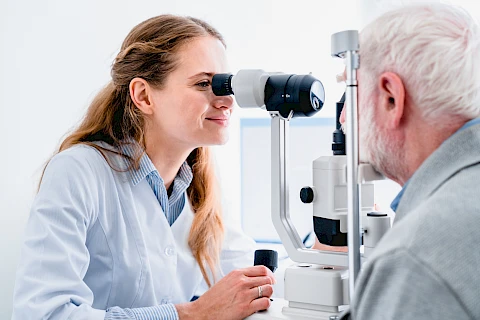
One important aspect of senior well-being is eye health. As health needs change, there is an increasing risk of glaucoma. Glaucoma is a severe eye condition that can lead to blindness if not treated in time. Early detection and timely treatment can make a significant difference for seniors living with it. Senior Helpers hopes to educate caregivers on recognizing the symptoms of glaucoma in seniors and on the value of regular eye exams.
What is Glaucoma?
Glaucoma is an eye disease that damages the optic nerve, leading to vision loss. There are several types of glaucoma. The most common ones are open-angle glaucoma and angle-closure glaucoma. Open-angle glaucoma progresses slowly and often without noticeable symptoms until significant vision loss has occurred. Angle-closure glaucoma can develop suddenly and is sometimes painful. It requires immediate medical attention. Glaucoma primarily affects peripheral vision but can progress to complete blindness if left untreated. Seniors are at higher risk due to the natural aging of the eye. Other risk factors include a family history of glaucoma, high blood pressure, and diabetes.
Common Symptoms of Glaucoma in Seniors
Recognizing the symptoms of glaucoma is crucial for early intervention. Here are some common symptoms to watch for:
Gradual Vision Loss
One of the earliest signs of glaucoma is the gradual loss of peripheral vision. It is when side vision diminishes before central vision. Seniors might notice difficulties seeing objects to their side. It makes tasks like driving more dangerous. Moving from bright to dim areas can also become challenging due to impaired vision.
Eye Pain and Discomfort
Although not as common in the early stages, some types of glaucoma can cause significant discomfort. This can range from mild discomfort to severe pain and may cause nausea or vomiting. The eyes often appear bloodshot and swollen, especially with angle-closure glaucoma. Severe headaches are common and usually occur on the same side of the infected eye.
Seeing Halos Around Lights
This symptom can significantly impact daily activities and is often described as seeing rainbow-colored circles around lights. Halos are usually more noticeable at night and can make driving difficult. This symptom can make engaging in routine tasks, like using the microwave or reading under a lamp, much more challenging.
Why Regular Eye Exams Matter
Regular eye exams are essential for the early detection and prevention of glaucoma. Seniors should have a comprehensive eye exam every 1-2 years, depending on their risk factors. During an eye exam, the doctor will check for signs of glaucoma through various tests. They include measuring intraocular pressure and examining the optic nerve. Early detection can prevent severe vision loss and improve the quality of life.
Glaucoma Management and Support
Some treatment options for managing glaucoma include eye drops and oral medications. They help lower eye pressure and prevent further damage. In some cases, surgery may be necessary to improve drainage from the eye. A balanced diet can help manage overall health, indirectly benefiting eye health. Keeping conditions like diabetes and high blood pressure under control can also reduce glaucoma risks. Websites, including the Glaucoma Research Foundation, offer valuable information on dealing with glaucoma.
Senior Helpers Can Assist With Eye Care
Senior Helpers offers a wide range of professional, in-home senior care services. If you live in the Rockford, Belvidere, Freeport, or Loves Park areas, contact us anytime at Senior Helpers Rockford. We are here to support you and your loved ones in ensuring optimal health and happiness, including recognizing the signs of glaucoma.